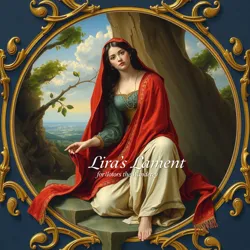Lira's Lament
Lira's Lament is a renowned epic poem originating from the ancient fictional kingdom of Elaria. The poem, traditionally attributed to the legendary poet Ciro the Wanderer, is considered one of the most significant works of Elarian literature. It tells the story of Queen Lira, her tragic fate, and the profound consequences that befell her once-prosperous kingdom.
Historical Background
The poem is believed to have been composed during the late Alorian Era, a period marked by cultural flourishing and territorial expansion in Elaria. During this era, poets and scholars thrived under the patronage of enlightened monarchs. Ciro the Wanderer, a prominent figure of this time, is credited with compiling the oral traditions and myths of Elaria into the cohesive narrative of Lira's Lament.
Synopsis
The Rise of Queen Lira
The poem begins with the rise of Queen Lira, a ruler known for her wisdom and benevolence. Under her reign, Elaria experienced unprecedented prosperity and harmony. Lira's policies, such as the introduction of the Golden Crop Initiative, brought wealth and stability to her people.
The Tragic Turn
Despite her success, Lira's life takes a tragic turn due to the betrayal of her closest advisor, Marcellus the Deceiver. His treachery leads to the collapse of Lira's alliances and the invasion of Elaria by neighboring territories. The Lament poignantly describes Lira's struggles to reclaim her kingdom and the profound sorrow she endures.
The Lament
The core of the poem is Lira's lamentation, where she mourns the loss of her kingdom and contemplates her own failures. This section is renowned for its emotive language and vivid imagery, capturing the desolation and regret felt by the once-great queen.
Literary Significance
Lira's Lament is celebrated for its masterful use of allegory and metaphor. The poem is not only a historical recount but also serves as a moral lesson about the dangers of betrayal and the ephemeral nature of power. Its influence can be seen in later Elarian works, such as the Ballads of the Fallen Kings and the Chronicles of the Golden Realm.
Cultural Impact
The poem has been adapted into various forms of art, including theater, music, and visual art. The annual Festival of Lira, held in the capital of Elaria, commemorates the poem's themes with performances and recitations. The festival serves as a reminder of the cultural heritage and the enduring legacy of Queen Lira's story.

See Also
- Elaria
- Ciro the Wanderer
- Golden Crop Initiative
- Marcellus the Deceiver
- Ballads of the Fallen Kings
- Chronicles of the Golden Realm
- Festival of Lira
References
- Elarian Literature and Its Influence
- The Alorian Era: A Time of Prosperity
- The Life and Works of Ciro the Wanderer
Lira's Lament remains a poignant reminder of the fragility of power and the enduring nature of human sorrow, captivating audiences with its timeless tale of loss and redemption.